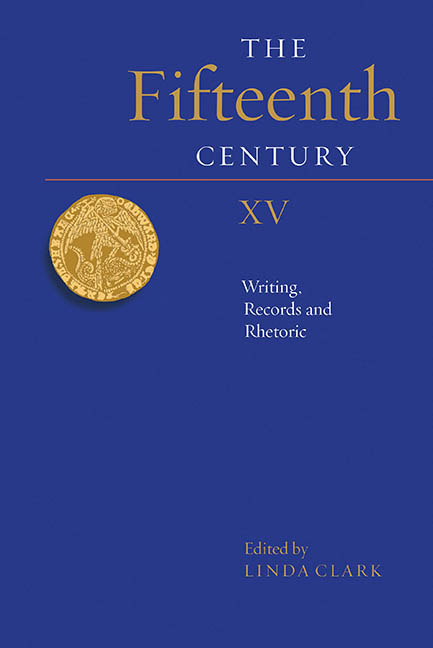Book contents
- Frontmatter
- Contents
- List of Illustrations
- Contributors
- Preface
- Abbreviations
- The Libelle of English Policy: The Matter of Ireland
- ‘Stories of Divers Regions and Provinces’: Some Digests of History and Geography for Late-Medieval English Readers
- ‘To please … Dame Cecely that in latyn hath litell intellect’: Books and the Duchess of York
- A Case Study in Lancastrian Service and Personal Survival: The Career of William, Lord Roos of Helmsley (c.1370–1414)
- Identity, Discourse and Political Strategy: Margrave Albrecht Achilles (1414–86) and the Rhetoric of Antagonism between Town and Nobility in Upper Germany
- The Redistribution of Forest Law and Administration in Fifteenth-Century England
- Well-Connected and Qualified Clerics? The Bishops of Dunkeld and Sodor in the Fifteenth Century
- Preaching Politics: Lancastrian Chancellors in Parliament
- Bishop John Alcock and the Roman Invasion of Parliament: Introducing Renaissance Civic Humanism to Tudor Parliamentary Proceedings
- Preaching on Magna Carta at the end of the fifteenth century: john alcock's sermon at paul's cross
- Index
- CONTENTS OF PREVIOUS VOLUMES
The Libelle of English Policy: The Matter of Ireland
Published online by Cambridge University Press: 23 August 2019
- Frontmatter
- Contents
- List of Illustrations
- Contributors
- Preface
- Abbreviations
- The Libelle of English Policy: The Matter of Ireland
- ‘Stories of Divers Regions and Provinces’: Some Digests of History and Geography for Late-Medieval English Readers
- ‘To please … Dame Cecely that in latyn hath litell intellect’: Books and the Duchess of York
- A Case Study in Lancastrian Service and Personal Survival: The Career of William, Lord Roos of Helmsley (c.1370–1414)
- Identity, Discourse and Political Strategy: Margrave Albrecht Achilles (1414–86) and the Rhetoric of Antagonism between Town and Nobility in Upper Germany
- The Redistribution of Forest Law and Administration in Fifteenth-Century England
- Well-Connected and Qualified Clerics? The Bishops of Dunkeld and Sodor in the Fifteenth Century
- Preaching Politics: Lancastrian Chancellors in Parliament
- Bishop John Alcock and the Roman Invasion of Parliament: Introducing Renaissance Civic Humanism to Tudor Parliamentary Proceedings
- Preaching on Magna Carta at the end of the fifteenth century: john alcock's sermon at paul's cross
- Index
- CONTENTS OF PREVIOUS VOLUMES
Summary
The Libelle of English Policy is a poem of some vigour and originality. Writing in 1436–7, the author describes and assesses England's commerce and strategic position, and commends policies, especially in relation to the promotion of trade and control of the sea, in terms of national interest. Extant in some eighteen manuscripts, the poem appears to have achieved significant early circulation. Outlining England's maritime destiny, it later became an iconic national text. Its inclusion in Richard Hakluyt's Voyages and Discoveries in 1598 and in Thomas Wright's Political Poems and Songs in 1861 assured its availability over the centuries. The first scholarly edition was published in Leipzig in 1878, and the standard edition by Sir George Warner appeared as long ago as 1926. A modern edition based on more manuscripts and engaging with scholarship over the past century is a desideratum. The value of the Libelle as a source of information on English trade and maritime policy has long been recognised. More recently, it has been valued for the insights it offers on the political culture of Lancastrian England. Given the precision with which the Libelle can be dated, and its prominence among a body of other contemporary writing on political themes, the anonymity of the poem is most disappointing. It is unfortunate, too, that the editor of the standard edition identified the author as Adam Moleyns, doctor of canon law, clerk to the council, and subsequently bishop of Chichester. Though the attribution has been shown to be highly implausible, it has proved very hard to dislodge. Furthermore, the focus on a man of formal learning and high official standing has perhaps deflected attention from evidence in the text itself that the author was a man of a rather different stamp.
The first part of this paper introduces the Libelle and the evidence relating to its authorship and context. It sets the poem in the broader context of news, information, policy debate and propaganda in the late 1430s. It acknowledges that the poet was articulate, intelligent and knowledgeable on a range of matters. His literacy and probable competence in Latin suggest that he was well schooled and may have obtained further training in dictamen. There is little in the poem, however, to suggest a university education.
- Type
- Chapter
- Information
- The Fifteenth Century XV , pp. 1 - 22Publisher: Boydell & BrewerPrint publication year: 2017

